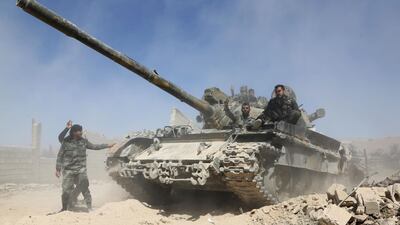Fresh air strikes pounded the rebel-held Syrian town of Douma on Saturday, completing 24 hours of carnage that killed at least 48 civilians, rescuers and a monitor said.
The bombing came after a 10-day truce between President Bashar Al Assad's regime and the rebels collapsed.
The offensive to reclaim Douma, the last pocket of resistance in the suburbs surrounding Damascus, also followed talks between Turkey, Russia and Iran, on Syria.
The three countries are active players in the conflict, yet on Wednesday they called for a lasting ceasefire.
It was not clear if Russia, the regime's main backer, or the Syrian Air Force had conducted the latest air strikes.
"The bombing has not stopped. We can't even count all the wounded," said Mohammed, a young doctor inside Douma.
"There are some wounded who we could not operate on in time, and they died," he added.
On Friday, the Syrian army launched a ground offensive on Douma's outskirts after talks sputtered over a rebel withdrawal.
________________
Read more
Syria troops prepare for anti-ISIL offensive near capital, monitor says
What became of the four rebel groups that once dominated the Syrian conflict?
________________
Regime forces have captured nearly all of Ghouta with a combination of ferocious bombing raids, which started on February 18, and negotiated withdrawals.
All that remains is Douma, the largest town, held by the Jaish Al Islam faction, home to tens of thousands.
The Britain-based Syrian Observatory for Human Rights said warplanes were hitting Douma on Saturday, as regime artillery fire hit neighbouring fields.
The Observatory said 40 people were killed on Friday, with eight more dying in the latest violence.
"The regime is trying to tighten the noose around Douma from the west, east, and south," said Observatory chief Rami Abdel Rahman.
Moscow announced a deal with Jaish Al Islam last Sunday, ushering in three consecutive days of evacuations from Douma that saw nearly 3,000 fighters and civilians taken in buses to Idlib, northern Syria.
But the exit plan stalled after reports that Jaish Al Islam remained divided over a withdrawal, and heavy bombing started to hit Douma on Friday afternoon.
The Observatory said there were dozens of air strikes, including some suspected to have been carried out by Russian warplanes.
Regime forces were locked in violent clashes with Jaish Al Islam rebels in agricultural areas to the southwest and east of the town, the monitor said.
A medic inside Douma described chaos at the local hospital as wounded and dead were brought in.
"The hospital is in a state of panic," the medic said. "Dentists are carrying out emergency surgeries. Dead bodies are being brought in pieces and are unrecognisable."
A doctor inside the town said state television was broadcasting the bombardment live.
"It feels like we're back in the days of the Gaza war" when Israel was bombing the Palestinian enclave and people around the world watched, he said, giving his name only as Mohammed.
State news agency SANA said Syrian air strikes hit the town on Friday in response to deadly rebel mortar fire from Douma.
It said mortar shells hit several suburbs of the capital and killed at least four people and wounded more than a dozen.
But Jaish Al Islam spokesman Hamza Bayraqdar in a statement late Friday denied that the group had targeted any Damascus neighbourhoods.
The air and ground offensive on Eastern Ghouta has killed more than 1,600 civilians and caused an international outcry.
The enclave on the eastern edge of Damascus had escaped government control since 2012 and, although it had shrunk over the years, it still covered sizeable territory two months ago.
The daily air raids kept residents cowering in basements for weeks and a ground assault soon sliced the area into three isolated pockets, each held by different rebel factions.
The first two were evacuated under Russian-brokered deals last month that saw more than 46,000 rebels and civilians moved to the northwestern province of Idlib, which the regime does not control.
Tens of thousands of people also fled through humanitarian corridors opened by Russia and Syrian troops.
Some have already returned to their devastated neighbourhoods, while others are staying in crowded shelters.
As talks over the third and final pocket of Douma dragged on, Russia and Syria's regime threatened Jaish Al Islam with a renewed military assault if they did not agree to withdraw.
Those still trapped in Douma had been nervous that any attempt to renege on plans to leave would prompt Russia and regime warplanes to resume deadly strikes.
In Ankara on Wednesday, the Turkish, Russian and Iranian presidents said there was "no alternative to the Syrian National Dialogue Congress", the Moscow-sponsored peace effort widely seen as a rival to the UN's Geneva process.
In a joint statement, Recep Tayyip Erdogan, Vladimir Putin and Hassan Rouahni said the so-called Astana initiative "had been the only effective international initiative that had helped reduce violence across Syria and had contributed to peace and stability in Syria".
The talks came just hours after US President Donald Trump signalled an exit soon from Syria, saying he wanted to "bring our troops back home".

